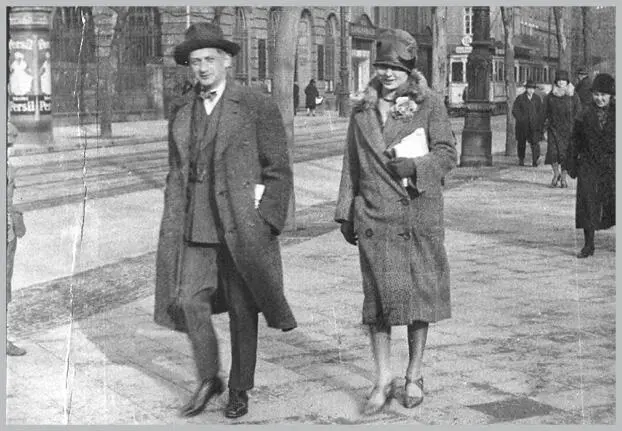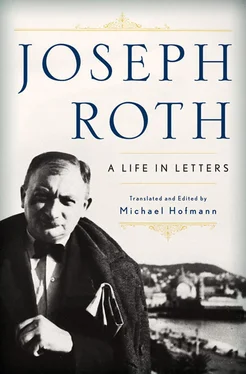At home, I found I had an invitation from the “Scholle,”1 and I duly went along on Saturday. A couple of dilettantes read their contemptible poems. A young lady condescended to participate. Her mother, a Jewess from Leopoldstadt, stood up and said: That’s my little girl. Those four words made her — the mother — immortal. More than the daughter will ever be by her writing. The mother will take up residence in the “Scholle,” and, please God, in a book of mine.
On Monday I went to the Burgtheater to buy tickets. I looked for my friend, Roth the actor, but didn’t find him. He wasn’t at home, maybe he’s left town. Nothing to be had at the box office. I went to the Deutsches Volkstheater. A lady cashier with a mustache. The mustache of an actor, who had had it taken off. She was frowning and hard as if she had food to sell. She looked as though she wanted me not to go near her theater. Purely to annoy her, I bought a ticket for the matinee show of Molnar’s Herrenmode , a piece of filth. On Tuesday I went to listen to Hubermann.2 He played a Bach etude with skill, froideur , and physical exertion. Then some Italian music with warmth and fervor. Finally, as I’d wished, “Ave Maria.” He played it in such a way that I can’t possibly torture you with it any more. Divine.
I felt a little rush of sympathy when he bowed stiffly afterwards. While playing, his expression was austere; the instant he puts down his bow, he loses all his majesty, he’s a poor wretch, almost shy. I thought of my story about the violinist.
I smoke Turkish cigarettes, a delicious aroma, and play with Helene’s little son. He’s blond and blue-eyed, wears a velvet jacket with two big pockets where he stores pencils, pens, pocket knives, chains, crumbs, gingerbread, and chocolate. He gets very dirty at times, and takes particular delight in making me dirty.
I took out a subscription at Last’s, and borrowed Otto Flake’s Logbuch . Flake3 is from Luxembourg, an Alemanne by birth, a cheery, healthy, and sensual type. Occasionally, in his descriptive passages he combines naïveté and inspiration, childish and serious touches so brusquely that you have the sense you’re reading Heine. But then he doesn’t have Heine’s Jewish sentiment, or French elegance. Sometimes he’s clear and objective, like Gottfried Keller, and as bitter and bracing as that. Keller was Alemannic too. You should borrow something of Flake’s, you won’t regret it. Resia4 should read him.
I was ill for three days, with the flu. I had myself looked after, drank chamomile tea, took quinine and aspirin. Today I’m feeling better.
Please tell your father — I’m writing to him under a separate cover — not to go off the deep end if I didn’t send him a card. Does he need a postcard from me with a couple of lines of writing on it to prove my gratitude and devotion? Where would that take us! It’s absurd to be so fixated on externals. I got sick, otherwise I would have written long ago.
If you have any mail for me, would you kindly forward it to me. I’m leaving next Sunday or Monday. Keep me posted.
Greetings to Aunt Resia, and Heini
Your Mun.
Best wishes to Frau v. Szajnocha!
1. Scholle : “soil” or “sod” in German. Almost always — as here — with an unpleasantly patriotic taint.
2. Hubermann: Bronislav Hubermann (1882–1947), a renowned violinist. There is a childhood photograph of Roth in 1905 with a violin.
3. Flake: Otto Flake (1880–1962), writer and essayist. Das Logbuch had just come out with S. Fischer in 1917.
4. Roth’s aunt Resia, wife of Siegmund Grübel.
PART II. 1920–1925: Berlin, Newspapers, Early Novels, and Marriage

JOSEPH ROTH WITH FRIEDL IN BERLIN, IN 1922
“No Eastern Jew goes to Berlin voluntarily,” Roth says in The Wandering Jews. “Who in all the world goes to Berlin voluntarily?” Not himself, for sure. But there was in the twenties in the German-speaking world no way around that often invoked “Moloch.” It had the appeal, within a relatively new federation, of an even newer center, with its score of daily newspapers putting out editions around the clock, its myriad openings in film and theater and book publishing, its evidently insatiable appetite for fresh provincial talent. Even if its streets weren’t paved with gold but with particularly unyielding paving stones, it still played the role of London in the story of Dick Whittington. (It was one of the jokes about Berlin that no one actually came from there; it understood all about outsourcing long before the word existed.)
Joseph Roth fetched up there in the summer of 1920, ready if need be, as he stylized it with his typical brio, to sleep on park benches and live on cherries. He had nothing organized, and went there on spec, and perhaps in a hurry. He had met Friedl Reichler in Vienna in the autumn of 1919, and successfully wooed her away from her fiancé (a fellow journalist, as it happens). But being — already — under no illusion about the unsteadiness of his life and prospects, and his besetting need for freedom (Brecht’s line in “Vom armen BB” might have been written for Roth: “In me you have someone on whom you can’t rely”), some honest and old-fashioned part of him (substantial, by the way: he wasn’t a principled cad like Brecht) would have conceded that he couldn’t offer stability, home, and a living to the young woman. Perhaps it was Friedl — only moderately disguised, by Roth’s standards — who was the “married woman” who threatened him (in no. 98) with losing his freedom, and for whose sake, so to speak, he upped sticks and went to Berlin (thereby breaking the engagement). Berlin, originally, was perhaps as much about personal liberty (Roth uses the phrase in no. 244, about his move to France, “La liberté PERSONNELLE”) as about professional advancement.
The professional advancement side of things went well. A writer as diligent, as versatile, as spirited, and as inspired as Roth did not want for work. By 1921, he had a regular engagement at one of the twenty dailies, the Berliner Börsen Courier , and made occasional appearances in a number of the others. (He made his debut in the Frankfurter Zeitung in January 1923.) This having “made good” elsewhere permitted him to return to Vienna in triumph (as one can imagine a man with his pride would have insisted on doing, not as a suppliant or a lucky winner) and swoop up Friedl after all. They were married in Vienna in March 1922. Roth, I think, loved Friedl and was proud of her — her sweetness, her appearance, stylish enough to pass for French — but never knew what to do with her. He kept her with him in hotels, or, on the frequent occasions when he was on the road somewhere, whether tours of provincial Germany or abroad to Russia, Albania, and Italy, he parked her somewhere alone, with just his money and his jealousy for company. No. 9 seems, touchingly and ominously, to cover many of the bases of the new existence, from the enigmatic ailment (what’s the matter with her arm?) and her curious misdating of the letter (they weren’t married in December 1921; is it that she hankers for that still to be the case?), to her anxiously trying to fit into his life, which could be no other way than the way it was, and half the time meant being alone and waiting up for him. With the benefit of hindsight, Roth almost always sounds regretful, as for instance in no. 79, a sadly ruminative but still relatively discreet letter to Stefan Zweig, whom at that stage he had yet to meet: “In a fit of mindlessness, I took on the responsibility for a young woman. I need to keep her somewhere, she is frail, and physically not up to a life at my side.” But even before Friedl began behaving erratically in 1928, Roth could sound resentful of his marriage: if you are synesthetically minded, you can surely hear the sailor’s tattoos in no. 21, from Marseilles, in the tough bit of worldly wisdom: “It’s only in a port that you know you’re married.” It’s there in his approval of a man going to Shanghai, of meeting the (ex-Austrian) Mexican chief of police, it’s there everywhere in his fiction where being stuck somewhere with someone is doom, and the final movement of so many stories and novels is an impetuous sudden departure: in Right and Left; in the magnificent, useless last scene of Flight Without End (whose title is often used to emblematize Roth’s life) where Tunda seems briefly to have outrun all his pursuers (one pictures his life, panting in the distance with its hands on its hips); of Hotel Savoy ; of “April” and “Stationmaster Fallmerayer” and “Rare and ever rarer in this world of empirical facts. .” in which the narrator congratulates himself on not having to describe a man “duped into love by a shallow affect,” but instead one “prompted by a profound instinct to flee bourgeois existence.”
Читать дальше













